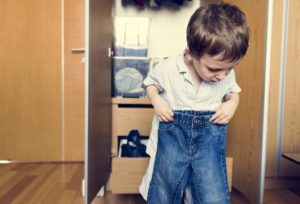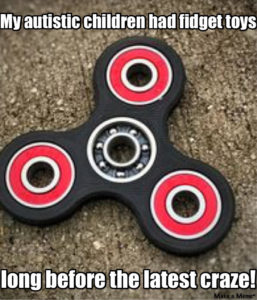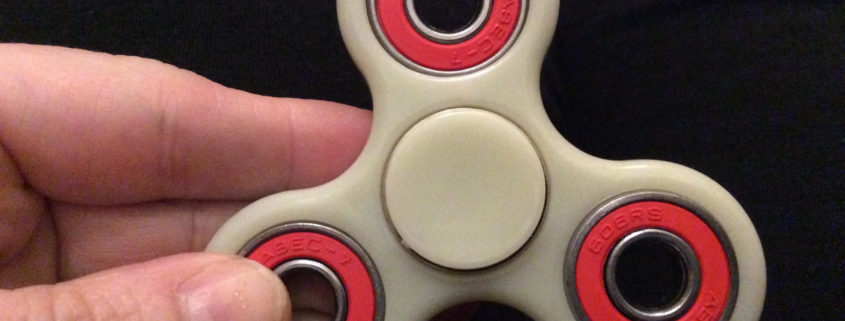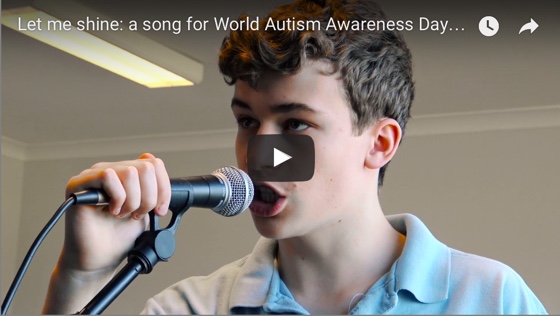My Great Autism Parent Expectations
/by K.M. Hodge Recently, buying my child a pair of jeans almost caused me to have an anxiety attack. For years, my son refused to wear them (read: meltdown). Instead, he wore activewear. Things with stretchy waistbands and breathable fabric. To the point that I thought that he wouldn’t wear anything else for the rest of his life.
Recently, buying my child a pair of jeans almost caused me to have an anxiety attack. For years, my son refused to wear them (read: meltdown). Instead, he wore activewear. Things with stretchy waistbands and breathable fabric. To the point that I thought that he wouldn’t wear anything else for the rest of his life.
Special needs kids all have a line they draw in the sand for things they are willing to try and things that they will flat out refuse no matter what. Whether it’s only eating yellow foods, or putting their clothes on backwards, or not getting dressed until their clothes are lined up neatly on their bed. When he was younger, I remember setting up my son’s clothes on his bed, just so, and some days I even let him go to school with his shirts and pants on backwards. Because moms have a line in the sand, too. I chose my battles carefully.
But things change. I don’t have to set out his clothes anymore and, for the most part, he puts them on right. Every once in a while I still have to ask him to turn his shirt around before leaving for school, but it’s no longer a line in the sand.
An in-home aide once told me not to try and create a world where he didn’t have meltdowns, but to raise my expectations of him … help him be prepared for an adult world that doesn’t allow for accommodations. It’s hard to do that, though, when the meltdowns last all day and night.
You try to figure out what things they CAN do for themselves and what things the autism and other associated diagnoses make nearly impossible to accomplish. Finding a way to help them cope and function outside the safe four walls of home is terrifying. And then, one day, you find yourself raising the bar because they’ve mastered that milestone. Or they raise the bar for you.
A few days ago, I found myself sitting in a changing room with my son while he tried on half a dozen pairs in search of the perfect pair. I watched my growing boy making a big first step. I know … it’s just jeans. But it’s never just anything, when you have a special needs child. The losses always outweigh the wins. So when even small milestones are achieved, it’s reason to celebrate. Because each new step is a hard-won step.
When Autism Fidget Toys Become the Latest Craze
/by Miriam Gwynne“Mum, it’s like everyone wants to be autistic like me now!” My 8-year-old daughter announced this as she came out of school on Monday.
She was referring to the latest “craze” for the fidget spinner in her school (and it seems every other school in the country). Suddenly it was “cool” to want to fidget, and if you didn’t have the must-have fidget toy, you were somehow the odd one out.
It did somewhat amuse me to think that after an entire month of autism awareness, all it actually took to make autism “cool” was a little handheld plastic and metal spinner!
Does having this fidget toy, which is marketed and made for those with autism and ADHD, become a huge international craze benefit those with autism or not?
It certainly seems to have made my daughter less stressed and self-conscious about her need to “stim” at school. Previously, it was rather obvious in her mainstream classroom which children had autism or ADHD, as they had access to special cushions, stress balls and tangle toys to help them concentrate or remain calm. While others were shouted at for fidgeting, a select few were allowed to “play” with these items at the teacher’s discretion. Having a fidget toy was something only children with a diagnosed condition were supposed to want or need.
Suddenly, all that has changed.
While this has the advantage of making children with autism feel more included and less isolated, perhaps even “cool,” it has some negative effects, too.
 How do you decide which children just want a fidget toy and which children really need it? Should schools allow all children the opportunity to fidget and “play” in order to enhance concentration and productivity, or are fidget toys actually a huge distraction in the classroom setting?
How do you decide which children just want a fidget toy and which children really need it? Should schools allow all children the opportunity to fidget and “play” in order to enhance concentration and productivity, or are fidget toys actually a huge distraction in the classroom setting?
In the U.K. and the U.S., a large number of schools have now placed bans on the latest craze of fidget spinners, claiming they cause problems in the classroom and are a health and safety risk. This is not the first craze schools have banned, of course, but this is perhaps the first time such an overarching ban has actually had such a negative impact on autistic students. After all, the manufacturers never set out for the toy to be used so casually by so many people, and it was, in fact, designed as a stress release for the autism/ADHD market.
My daughter would be devastated if her school introduced a similar ban. For her, the fidget spinner is not a must-have craze to be like her friends, but more a stress release from the demands placed upon her during her school day—much the same as she uses a stress ball or her twist-and-lock blocks. When schools decide to ban sensory and fidget toys, they risk isolating the very children they’ve spent years trying to include.
I am loving seeing my daughter play together with children in her class with a toy she is confident in and comfortable with. It is rare for a craze to include her, as she is usually socially unaware of what others are doing. To see her included of her own doing is beautiful. I love that the world is now seeing sensory and fidget play as “normal” and not something to be mocked or frowned upon. I love that the current “in thing” is now readily available in shops everywhere and very inexpensive. It requires no language and little skill, so everyone can join in.
But I worry too. I worry that schools are quick to react and ban everyone from using fidget spinners just because they are so popular. I worry that when everyone else moves on, my daughter will be the one left standing alone, still spinning her little handheld plastic spinner by the school gate and once again ignored by her peers. I worry that people will see her as just “playing” like everyone else and forget that, for some, these fidget items are a necessary stress release and stim.
Time will tell how long this latest trend lasts. For now, though, I can see my daughter’s point. It really is like everyone suddenly wants to be autistic. I am watching with interest in the hope this has a positive impact for awareness and acceptance of not just my daughter, but the rest of the autistic population too.
Parents Make a Mini Blockbuster Store for Their Autistic Son
/by Rachel L. MacAulayBlockbuster declared bankruptcy back in 2010 and even though DISH Network bought the last stores in 2011, most of us just assumed that all Blockbuster stores were long gone. But it turns out that there are still a few in Alaska and Texas.
Unfortunately, the one in Sharyland, Texas, also just closed its doors, and its closure has gotten Twitter user Jaavii’s 20-year-old brother, Hector, upset. Jaavii posted on the social media site that his brother, who has autism, “was sad that Blockbuster was closing down.”
But Hector didn’t have to be sad for long, as his parents built him his own “mini Blockbuster,” stocked with his favorite movies and cartoons. They even got a DVD rack topped with Blockbuster signs that they’d bought from the store when it closed.
While Hector is non-verbal, Jaavii’s photos show that his brother was happy and clapping with joy. Our hats off to these enterprising—and ausome—parents.
Let Me Shine: A Video
/by Rachel L. MacAulayWhat do you get when you combine the talented, autistic teenagers living at Prior’s Court in Hermitage, Berkshire, U.K., the band Low Island, and a very catchy song? You get goodness. Pure goodness.
Low Island’s drummer, Tomson Chauke, works at Prior’s Court and wanted to showcase the wonderful relationship between the staff and residents, most of whom are non-verbal and spent months learning the song’s lyrics.
Tomson explained, “It started with a member of staff being inspired by the engagement and enjoyment that our young people, who are severely challenged by their autism, have with music…. We are proud of the song and the way in which it celebrates the uniqueness of our young people and how, when given the chance, they shine.”
Turn it up. Way up.
When the Weight of the Unknown Is Crushing You
/by Mandy FarmerThere was a time before our son’s autism diagnosis when I felt completely lost. Everything we had brought up to the pediatrician had been disregarded. He was significantly behind in speech at 15 months old. He wouldn’t pick up food or even hold his own bottle or sippy cup at one year old, and his meltdowns from sensory issues and transitions were occurring hourly. He just seemed miserable all of the time. We thought maybe severe allergies were bothering him, but everything came back negative. We took him to the dentist because he was constantly chewing on everything, but that all looked normal. I finally sat down one night and took the MCHAT (the autism screening tool) online and realized that even though he made eye contact, he had pretty much every other red flag.
So, at three years old, he was evaluated by the school district and then by a medical team. Both teams came back with a severely autistic diagnosis. And I felt relief to finally know. And I felt bad that I felt relief. But I was glad to finally have an answer and hopefully a way forward to help him.
However, after they finally answered that unknown, it only opened up the door to many more unknowns. The more I read on the subject, the foggier I was on everything from treatment to which resources to trust.
I remember being told at his kindergarten IEP meeting that in a couple years we would have to make the choice between a diploma track or a certificate of completion track. How am I supposed to make that decision in third grade? How do I know if he will have the attention span to take the required yearly state tests? Will they accommodate him? With his behaviors currently so sporadic from one week to the next is mainstreaming him at any point a total pipe dream? Will he be one of those autistic children who responds so well to interventions that we should have chosen the normal diploma track?
At that same meeting, we were handed a pamphlet about getting on a waitlist now (in kindergarten) if we think he would need Medicaid services or housing after he gets out of school. Oh, that one stung. When we are looking at our savings and our options, we do not know if we should be setting aside a college fund or funds to put him in a home. We do not know if we should put anything in his name, as it could disqualify him from getting disability when he ages out of the education system. Will he need disability? I suspect so, but I hope not. What will happen to him when I’m gone? Will his siblings take care of him? Is it right to even ask that of them? I just don’t know, and it weighs heavily on my heart and mind.
When we look at the therapies and the educational setting that is helping him so much right now, we don’t know how long it will last. Will they pull services out from under him if he progresses too much or too little? Will the government cut funding to services that help him and others like him? Will our insurance continue to cover the therapies he is getting, or will accessing those services get harder and harder? Will his new school district be able to offer him an appropriate education next year? I’m not sure of any of that, and I think most of us autism parents are holding our breath expecting the other shoe to drop.
He is currently on a medication regimen that is working for him. Do the benefits outweigh the long-term side effects? I hope so, but I don’t really know. Will this medication work for him for awhile or, as his body changes and he grows, will we be back to square one? It’s another unknown and another issue we know we could be facing just around the corner.
I feel like all of the unknowns run on a constant cycle in my head. The anxiety over the unknown can sometimes feel like an unbearable weight that I have no choice but to bear. The best thing I can do as his mom is to focus on the now and hope the answers to unknowns reveal themselves in time. Until then, I’ll hope for the best, prepare for the worst and love him with all I’ve got.










